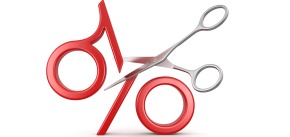In the face of slow economic growth, the Reserve Bank of Australia (RBA) has cut the official interest rate for the first time since August 2013, in a move to stimulate business activity and encourage household spending.
The RBA has cut the 2.5 per cent cash rate by 25 basis points to a new record low of 2.25 per cent. While some economists agree that the cuts are a good move, others seemed surprised.
“[The] Reserve Bank decision comes as a shock because most experts were betting on the cash rate to remain unchanged [yesterday]. In fact, 28 of the 30 leading economists and experts from the finder.com.au Reserve Bank Survey got it wrong,” says finder.com.au spokesperson Michelle Hutchison.
Some economists are already predicting a second 25 basis points cut, which could be upon us as soon as next month. According to Senior NAB Economist David De Garis: “There’ll be room for another cut this year, how soon remains to be seen. We’ve been thinking two (cuts) and it’s hard to steer away from that at this point.”
RBA cut will affect retirees most
Whilst the Reserve Bank’s rate cut is good news for mortgage holders, it seems the hardest hit will be retirees. The rate cut is designed to encourage those who already owe money to spend more money, under the illusion that they’ll have a little more in their pockets. However, those who have already toiled for years to pay off previous debt and who now live off their hard-earned life savings will be put through the wringer. Still, with the population ageing, I suppose it was only a matter of time before the ‘big bank’ found its next cash cow – retirees.
Let’s cut to the chase and see who benefits and who suffers most from the RBA rate cut.
Winners
- good for those with debt/s (except credit card debt)
- good for those with overseas investments, such as managed funds invested in overseas-listed shares (unless the fund is hedged for exchange rate risk)
Losers
- interest-bearing investment holders
- anyone trying to save money
- those living off their savings, ie: retirees.
Mortgage holders stand to benefit most, potentially enjoying monthly savings of around $50, on a $300,000 loan, to $120, on an $800,000 loan. Some mortgage rates could potentially reach their lowest levels in almost 50 years.
Those with interest bearing investments will feel the harshest sting of the Reserve Bank’s slashed cash rate with their cash savings earning less interest.
Retirees currently living off these savings could be hard pressed to bridge the future shortfall – especially when taking into account the limited employment options available to over 65s. To make up for the loss of earnings, those in retirement may instead have to consider higher risk investments which earn greater interest, or tighten their belts – either way, it’s a tough pill for most to swallow.
One thing that may assist retirees is the possibility of Centrelink adjusting the deeming rules in order to free up some cash for those living off their savings. The question is: should retirees hold their breath and wait for that ‘sign of good faith’ from the government?
How does the RBA’s rate cut affect you? Are you prepared to take on more risk with your investments? Or will you now have to ‘tighten the belt’ even further and ride it out?
Read more at SBS News.
Read more at The Age.
If you’d like to calculate how much you’ll save on your mortgage, or how much you can afford to borrow, why not try Money’s Borrowing Power Calculator?

